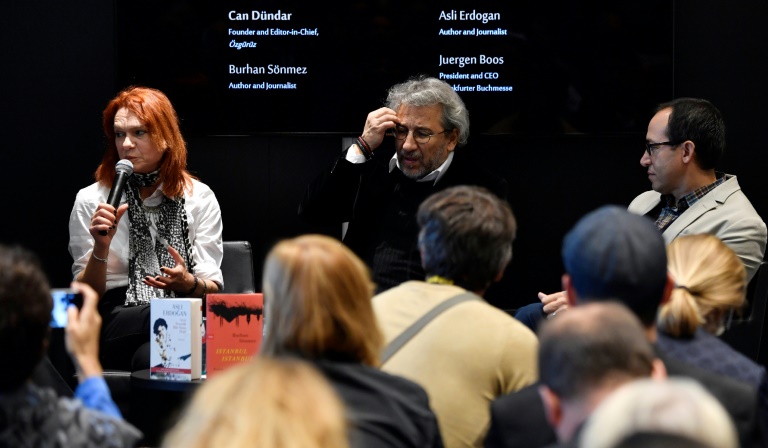Thinking back to his months in an Istanbul prison last year, Turkish journalist Can Dundar recalls a fellow inmate asking a guard for a book from the prison library.
“We don’t have the book, but we have the author,” came the reply.
The anecdote, told with a wry smile during a roundtable discussion at the Frankfurt book fair, exemplifies Turkey’s crackdown on freedom of expression in the wake of last year’s failed coup.
Among the more than 50,000 people arrested since then are some 180 journalists, and President Recep Tayyip Erdogan has faced fierce criticism from the West over the repression.
But Dundar — seated next to celebrated Turkish novelist Asli Erdogan, herself held for four months on “terror propaganda” charges — urged European governments not to turn their backs on Turkey as the rift with Erdogan widens.
“Isolating Turkey means supporting Erdogan, not us,” Dundar told the audience. “Pushing Turkey to Russia and Iran is not a smart idea.”
Millions of Turks voted against granting Erdogan sweeping new powers in last April’s controversial referendum, he added.
And recent opinion polls had shown a drop in support for the veteran Turkish leader, who first came to power in 2002.
“At least half the country now is resisting, suffering and struggling at the same time,” the former editor-in-chief of the Cumhuriyet opposition newspaper said.
– ‘Not Erdogan’s Turkey’ –
The roundtable talk was one of a series of events at this year’s book fair, the publishing industry’s top annual showcase, to shine a spotlight on press freedom in Turkey.
Earlier this week jailed Turkish investigative reporter Ahmet Sik received an award in absentia for courageous journalism, and supporters of Germany’s Die Welt correspondent Deniz Yucel called for his release under the banner #FreeDeniz.
Award-winning novelist Burhan Sonmez, the third participant in Thursday’s discussion in the western German city of Frankfurt, said he had recently returned to live in Istanbul after spending a decade in Britain.
He said dissenting voices live under a cloud of fear in Turkey.
“You don’t know what’s going to happen the next morning. You could be at work or in prison,” he said.
But it was also what spurred him on. “You have to speak, you have to write. Because you could be next.”
“Erdogan believes that Turkey belongs to him, but Turkey belongs to us,” he went on. “We are the cultural, social life.”
Dundar, who fled to Germany after being sentenced to a near six-year jail term for revealing state secrets, described a constant cat-and-mouse game with Turkish authorities in a bid to circumvent restrictions and reach readers.
“Since the media is controlled by the government we need to find new ways to express ourselves and give voice to the voiceless.
“Thank God people in Turkey know how to reach censored websites,” the bespectacled 56-year-old added.
– Not forgotten –
Asli Erdogan, 50, who was freed in December pending trial but only saw her passport returned to her last month, said however it was “too easy to blame everything on Erdogan”, pointing to Turkey’s fractured opposition.

Writers and journalists like Can Dundar, Asli Erdogan and Burhan Sonmetz live under a cloud of fear in Turkey
“The Armenian issue, the Kurdish issue, these are faultlines that break the opposition. We can’t form a strong barrier against Erdogan and his tyranny because of these faultlines.”
Dundar and Asli Erdogan both pleaded for more solidarity with the writers being detained — not just with words but with action.
“We have to tell them we haven’t forgotten about them,” said Erdogan, whose next court date in the trial over her links to a pro-Kurdish newspaper is on October 31. She faces a lifetime behind bars if convicted.
Dundar — who was arrested after publishing an article accusing Turkish intelligence services of trafficking arms to Syria — urged journalists around the world to pick up the baton and follow up on “the banned stories, the censored stories”.
That would show the detained reporters they were being supported, he said.
“And to the government it would send the message: If you touch a journalist, you only make the story bigger.”






